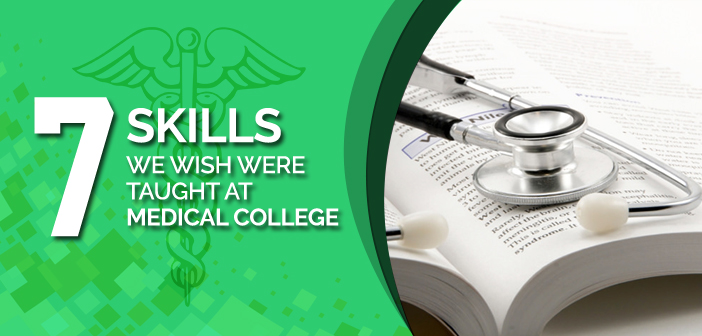In these series, I share from the experience and personal learning of my 30-year journey in the healthcare delivery industry starting as a rookie intern, then working as a C-level executive in Apollo Hospitals Group and now advising investors and consulting firms on the healthcare industry in emerging markets.
A Tale with Two Different Outcomes
Two young doctors set up practices after they finished their graduation/post-graduation studies. Both had similar backgrounds, received comparable education, obtained comparable grades and had similar potential, but one of them established a great practice with multitudes of satisfied patients and earned tremendous respect amongst their peers, while the other did reasonably well but was unable to match the success of their colleague.
In other words, one doctor performed extraordinarily well (by whichever standards we choose to measure), whilst their colleague was ordinary.
What are the factors that contributed to one doctor making the transition from a ordinary to an extraordinary doctor?
Are knowledge base and clinical skills the only factors that contribute to performance and achievements, or are other factors also responsible? Is it luck, circumstances or other such reasons?
What’s It Take to be a Superstar?
Many studies over the last three decades have conclusively established that it is neither the knowledge base, nor intelligence and hard skills alone that are responsible for superlative performance, but an additional group of factors that help to establish the difference between ordinary and extraordinary performance.
Before discussing further, let’s establish the meaning of competency. A simple definition of competency is the ability to do something successfully or efficiently. In short, competencies are a cluster of skills and knowledge that enable a person to do a job effectively. Most doctors would instinctively state the following as competencies that facilitate extraordinary performance:
- A high IQ (Intelligence)
- An up-to-date knowledge of disciplines and specialities concerned
- Sufficient hard skills for us to diagnose, operate or perform clinical procedures (Hard skills)
In effect, most of us believe that the above three, the troika of knowledge “skills” intelligence should be enough to give us the edge to deliver an outstanding performance. However, this is not true, as these are what we call “threshold competencies”. (A threshold is the strip of wood or stone forming the bottom of a doorway and is crossed while entering a house or room.) So, we need these skills to cross the threshold and be counted as competent doctors ”good doctors” but there are other skills and competencies that serve as differentiators or “distinguishing competencies”.
These distinguishing competencies that differentiate a good from a great doctor, and drive excellent performance are:
Some of these are skills on their own and others are competencies – a mix of knowledge and skills and in these series it is my intention to discuss each individually.
Let us use a simple construct or model of the brain to help us to build an understanding of the issue
We all know that the brain consists of two halves or hemispheres “right and left” which are connected to each other by a bridge of fibres called the Corpus callosum. A behavioural science model of the brain states that the right and left halves of the brain have different functions, which are outlined in the figure below (This is not the anatomical model that is taught in our Neurosciences studies in medical colleges):
Everyone uses both these halves in their daily lives, but it is the ability to use both halves equally well that adds the word “extra” to ordinary. The great doctors are the ones who are able to use both the lobes of the brain effectively and efficiently as and when required to do so.
The seven competencies that we will be discussing are a mixture of right and left lobe functions, but a lot of them will be part of the right brain function.
Our Indian educational system emphasises the use and proficiency of the left lobe abilities alone, while the right lobe abilities are somewhat neglected. This makes us less skillful in the use of right lobe abilities, which we try to master as we go through various life experiences.
It is possible to hone these skills, which come under the umbrella of Emotional Competence or EQ. We can hone our skills that depend on use of the right lobe by undergoing systematic training, which unfortunately does not form part of our medical curriculum.
Next week, we will be discussing the first of our differentiating competencies: “Listening Skills”.






Appreciate the analytical talk which is thought stimulating……yess we need to overdo our system of learning n implementation..
Dear Dr. Manisha,
Thank you for taking the time and responding. We are hoping that we will create momentum in order to influence change in Medical Education. I invite you to give your valuable insights on Part 2 of the series.
http://catexhealth.com/blog/listening-skills/
A very structured way of putting forth the importance of a skill of using our right lobe.
A very structured way of putting forth the importance of a skill of using our right lobe. Very important part of being a medical professional
Very very good sirji.we definitely tone up our left hemisphere and neglecting our right hemisphere in our education system.thanks archana for sharing the link.
Indeed we are not taught the tips & trics of clinical practice. In 4.5 years of graduation & there after 2, 3 or 6 years of PG Diploma, Degree or DM course, we are filled with medical knowledge but how to deliver, is left over the individual, & that makes the difference amongst the Doctors.
Dear Dr. Rai,
Thank you for taking the time and responding. We are hoping that we will create momentum in order to influence change in Medical Education. I invite you to give your valuable insights on Part 2 of the series.
http://catexhealth.com/blog/listening-skills/
Dear Dr. Yadav,
Thank you for taking the time and responding. We are hoping that we will create momentum in order to influence change in Medical Education. I invite you to give your valuable insights on Part 2 of the series.
http://catexhealth.com/blog/listening-skills/
Dear Susy,
Thank you for taking the time and responding. I invite you to give your valuable insight on Part 2 of the series.
http://catexhealth.com/blog/listening-skills/
Dear Dr. Shenoy and dear Archana,
Thanks for forwarding this beautifully written blog highlighting that “extra” in each one of us. This could be story of some of us who always made it a point to walk that “extra mile” in life to get maximum mileage. I feel that in us Indians, it’s Corpus Callosum which is at the helm of whole story and onus is on it to strike the right balance between IQ and EQ to aquire that ‘E’ in life!
Thanks again and looking forward for next edition of your blog. Take care.
Thank you Sanjay, we invite you to share your articles also. We are planning to convert this into a multi-author blog page.
In today ‘s practising environment for the physicians it has become a necessity to acknowledge these various aspects of practice.
Thank you Dr. Swati, we invite you to share your articles also. We are planning to convert this into a multi-author blog page.
Sir,
“Well Begun is Half Done”
A good structured thought provoking effort for most of us Left Dominant creatures.
I sincerely hope that your efforts reach the somnolent Health Educationists.
In my personal opinion inclusion of Behavioral Sciences in the Undergraduate Medical sciences might be of great help.
Sincerely looking forward for the rest of series
Once again Kudos for your effort
Dear Anurag, Thank you for your encouragement and comments. Looking forward to your active contributions.
Gentle Doctors,
Speaking as amother professional who has worked along side your colleagues for some time I must encourage you in this area of broadening your scope of awareness. Many other professionals are caught in the same traps as you when it comes to applying your hard won technical knowledge in an unaware client / patient marketplace. As Dr. Robinson points out how we apply that knowledge makes the difference over time.
Those of us who listened to our parents who tried to teach us the lesson of two eyes, two ears and one tongue probably fair better in our businesses and professions. This lesson of quiet observation is at the heart of your chosen professional life. Learn to apply it and you will very likely find an inner satisfaction of knowing you are taking care of your whole patient not just their aches and pains.
Dr. Robinson, I look forward to you upcoming posts.
Andrew
AEC/FM Leader l PGA Training
Thank you Andrew. We appreciate your valuable contributions. Looking forward to your comments on the blog.
Dear Shenoy
It is a beautiful article.you have covered majority of the points which are important in life to succeed.I also want to say that you have rightly put the importance on finance.I will also like to add for sustained growth you need to be flexible to delearn & relearn.
Thank you Dinesh.
Appreciate your comments.
Dr Shenoy, congratulations on well written concise blog. The Indian educational system stresses too much on academic excellence. And in achieving this academic excellence, in predefined limits,we are inadvertantly killing creativity.
We forget that scientists of foregone era were good artists also which stimulated softer skills.
We see day in and day out, that parents sent their kids to hobby classes to develop alternative skills but they fail because ::
1- They take up these activities only during vacations
2 Expectation to do well in extrcurricular activities takes second place to academics.
I think nonacademic interests should be a driver rather then a passanger in an educational system.
The same problems are there in our medical educational system.
Too much stress is on learning protocols than on developing softer interpersonel , communicating and creative skills.
We should encourage out of box thinking as personality and charcter can not develop in a box.
If possible , introduction of a credit system in nonacademic unrelated field is a way to go. Intially by compulsion and later voluntarily.
This was an interesting read on a very relevant topic.
While most of the other comments are by doctors, I am writing from the perspective of a management consultant. In our firm, I often use the analogy of a doctor to explain to young consultants client expectations and how clients perceive us. After all, that relationship is probably the only case young people have experienced in seeking a professional service that is critical.
Some common topics we discuss are: “How do you assess a doctor? You don’t ask them to show you marks sheets and certifications. So, how do you decide?” “At what point do you decide to trust a doctor with your well being? The point where you literally put your life in their hands”, “What behaviours of the doctor will make you lose faith in the person?”, “If a surgeon suggests an operation, how do you decide whether it is really needed or a scam?”
After all, we are doctors for organisations and our clients are the same people who are the patients of doctors. So, it works as a good way to get consultants to put themselves in the clients’ shoes.
I will be recommending your blog posts for the team to read and look forward to the next post
An interesting post by Mr Alagu Balaraman. It’ seems strange to be put in a specimen jar but we do make interesting study material i.e. Disconnected high achievers .
Dear Manbir, Thank you for your very incisive comments. Yes we are very left lobe oriented and hope that with more people like your self speaking up the education system might change.
Dear Alagu,
Thank you for your big thumbs up. I love the way you have talked about the assessment of a doctor by patients.
Very powerful statement!
We intend to make such words available to a wider audience of doctors.
Greetings Dr Shenoy Sir,
Thanks a lot for sharing the wonderful information, Though being a non medico, it has given me a new perspective to look at things especially dealing with doctors and patients as an Operational Head of Healthcare services, Kindly keep sharing.
Congratulations and All the very best for grand success in this mission.
Regards
Mayur Dave
Thank you Mayur. Appreciate your comments.
All the best!
WELL THOUGHT & WELL WRITTEN. A THOUGHT-PROVOKING ARTICLE. LOOKING FORWARD TO THE NEXT IN THE SERIES. DR. ALKA.
A Carnegie Inst. Of Tech Report once cited that ” 85% of your financial success is due to your personality and ability to communicate, negotiate and lead. Shockingly, only 15% is due to technical knowledge”.. I strongly believe in this from my personal observations in the society & it’s not just limited to financial success but any other aspect. To put it more simply, you can only achieve so much with your own linear hard work (24×7). For a nonlinear success you need other people to work for/with you.